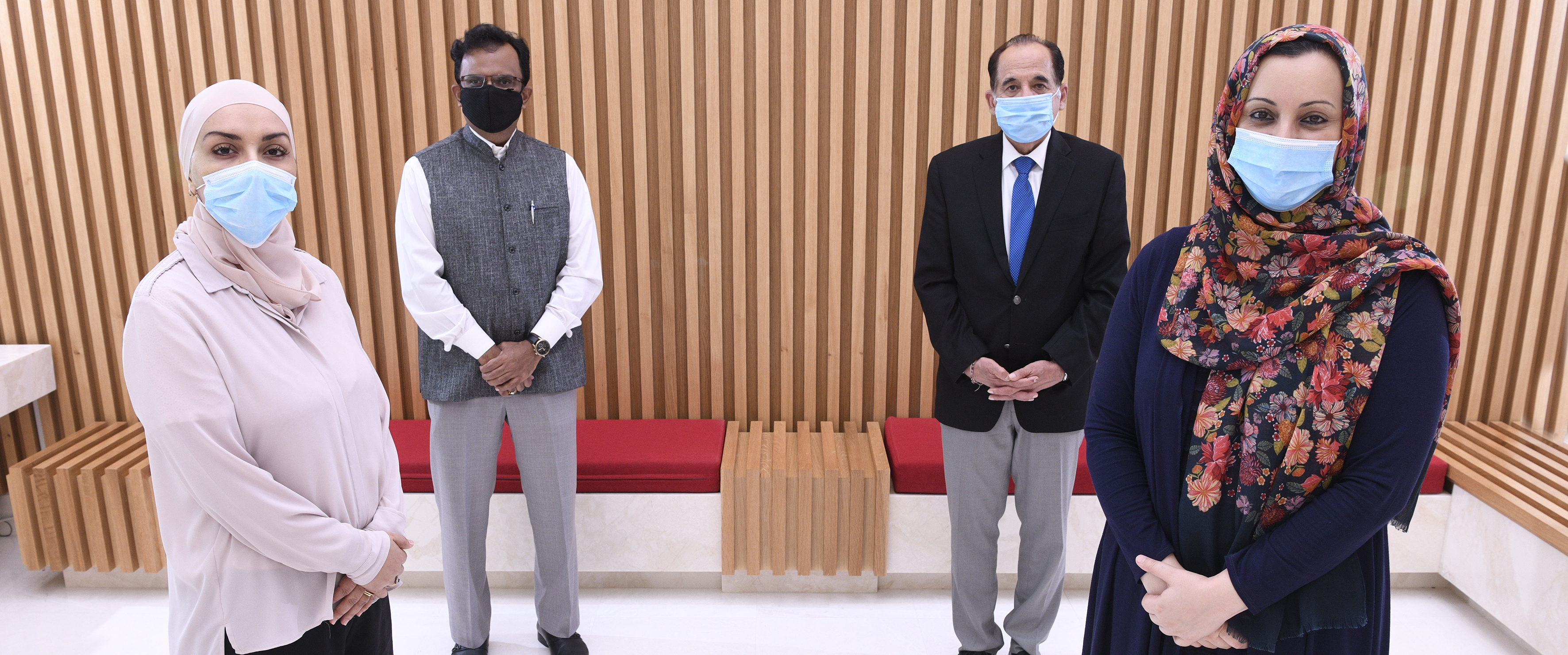WCM-Q researchers provide evidence for effectiveness of facemasks in preventing Covid-19
 Dr. Karima Chaabna, Dr. Sathyanarayanan Doraiswamy, Dr. Ravinder Mamtani, and Dr. Sohaila Cheema.
Dr. Karima Chaabna, Dr. Sathyanarayanan Doraiswamy, Dr. Ravinder Mamtani, and Dr. Sohaila Cheema.
Researchers from Weill Cornell Medicine – Qatar have demonstrated the effectiveness of medical facemasks in helping to prevent respiratory infections like COVID-19 and strongly recommend their use by the public along with other preventive measures to help mitigate the spread of the disease.
The research, which has been published in the International Journal of Infectious Diseases, was conducted by faculty from the college’s Institute for Population Health (IPH), which carried out a meta-analysis of previous studies on the efficacy of medical facemask use in community settings for preventing flu, flu-like illnesses and other respiratory infections such as SARS and the novel coronavirus. The research is authored by Dr. Karima Chaabna, population health and communications specialist in IPH and instructor in population health sciences, Dr. Sathyanarayanan Doraiswamy, assistant director of IPH and instructor in population health sciences, Dr. Ravinder Mamtani, vice dean for student affairs-admissions, population health, and lifestyle medicine and professor of population health sciences and Dr. Sohaila Cheema, assistant dean of IPH and assistant professor of population health sciences.
Although transmission of COVID-19 through close contact with an infected person or contact with a contaminated surface is recognized, the efficacy of facemasks in reducing transmission in household situations and public settings like supermarkets has been contested, and recommendations have been inconsistent.
Dr. Cheema said: “Globally, there has been a lack of consensus from the leadership and health organizations to offer united recommendations about facemask use to prevent COVID-19 transmission. In countries such as the United States, facemasks have proved divisive and have even been politicized, so we wanted to ascertain - with as much confidence as possible - whether there was hard evidence to support the use of facemasks in preventing respiratory disease transmission.”
The research group evaluated 12 primary studies which had previously examined medical facemask use and found that the incidence of transmission of respiratory infections was lower if medical facemasks were used early and used in conjunction with stringent hand hygiene. One study conducted during the COVID-19 pandemic found that medical facemasks were of particular use in infection control if worn before an individual displayed symptoms of infection.
But the WCM-Q study - which is entitled ‘Facemask use in community settings to prevent respiratory infection transmission: A rapid review and meta-analysis’ – was unable to find any evidence that cloth facemasks were effective in reducing transmission in community settings. It should also be mentioned here that there was one study - performed in a healthcare setting - which demonstrated that healthcare workers who wore a two-layer cloth facemask were 13 times more likely to be infected with respiratory illnesses than those who wore medical facemasks.
However, this does not mean that cloth face masks are not of use, rather that medical-grade masks are more effective. The authors suggest that the efficacy of cloth facemasks is likely to depend on the number of layers they contain, and the material used.
Dr. Mamtani said: “The evidence is quite clear that medical facemasks should be worn by both healthy and sick individuals in order to reduce virus transmission. The effectiveness of medical facemasks obviously depends on them being used correctly and we cannot overstate enough that facemasks alone should not be relied upon; we must all continue to practice all preventive measures including physical distancing and rigorous hand hygiene to minimize the risk of both spreading COVID-19 and contracting it.
“The evidence for the use of cloth facemasks is inconclusive. Because of this, we would recommend the use of medical facemasks, but if there is no alternative it would appear to be prudent to wear a cloth facemask in community settings.”
The full study and its findings can be read at https://www.ijidonline.com/article/S1201-9712(20)32150-0/fulltext